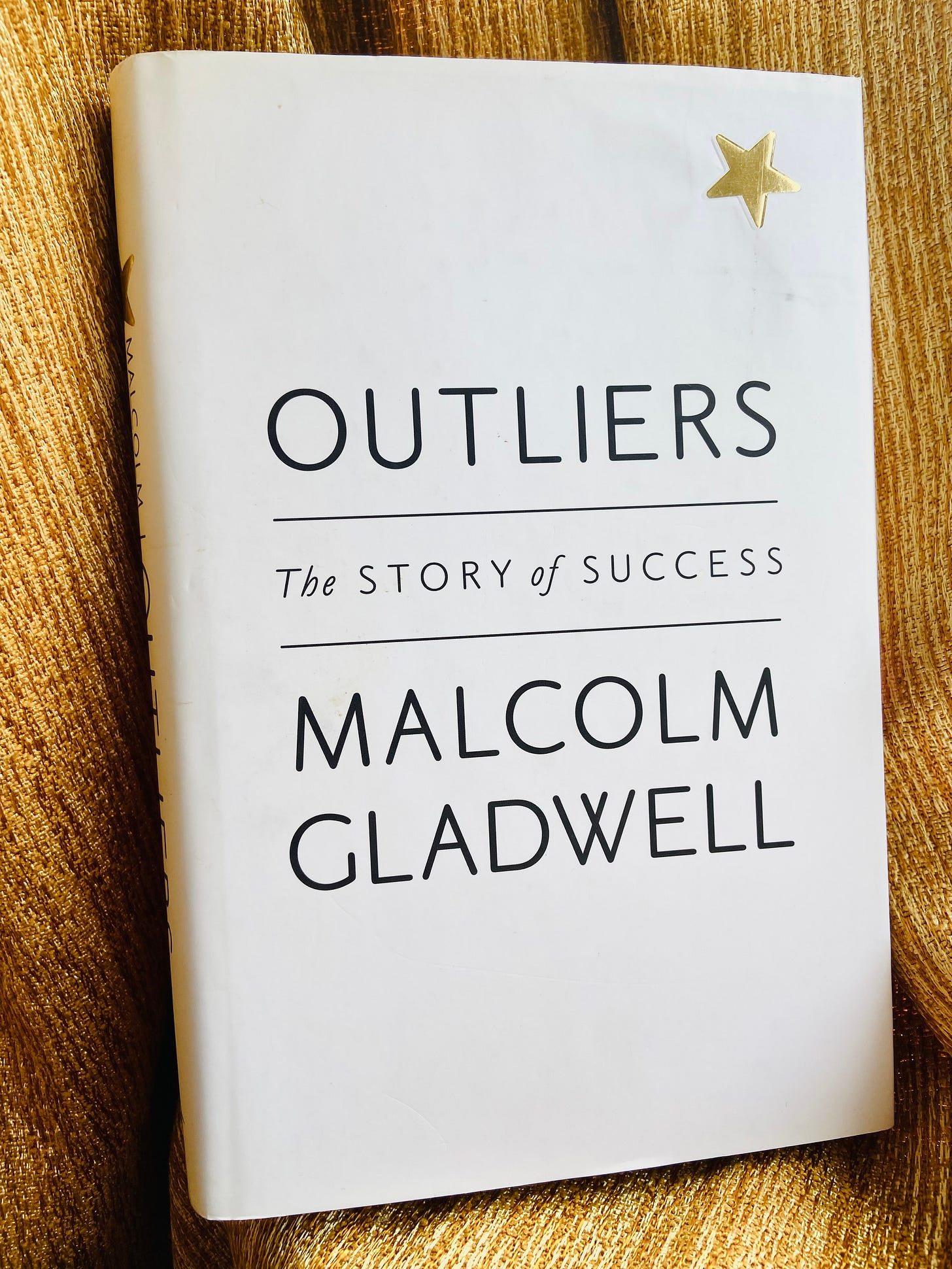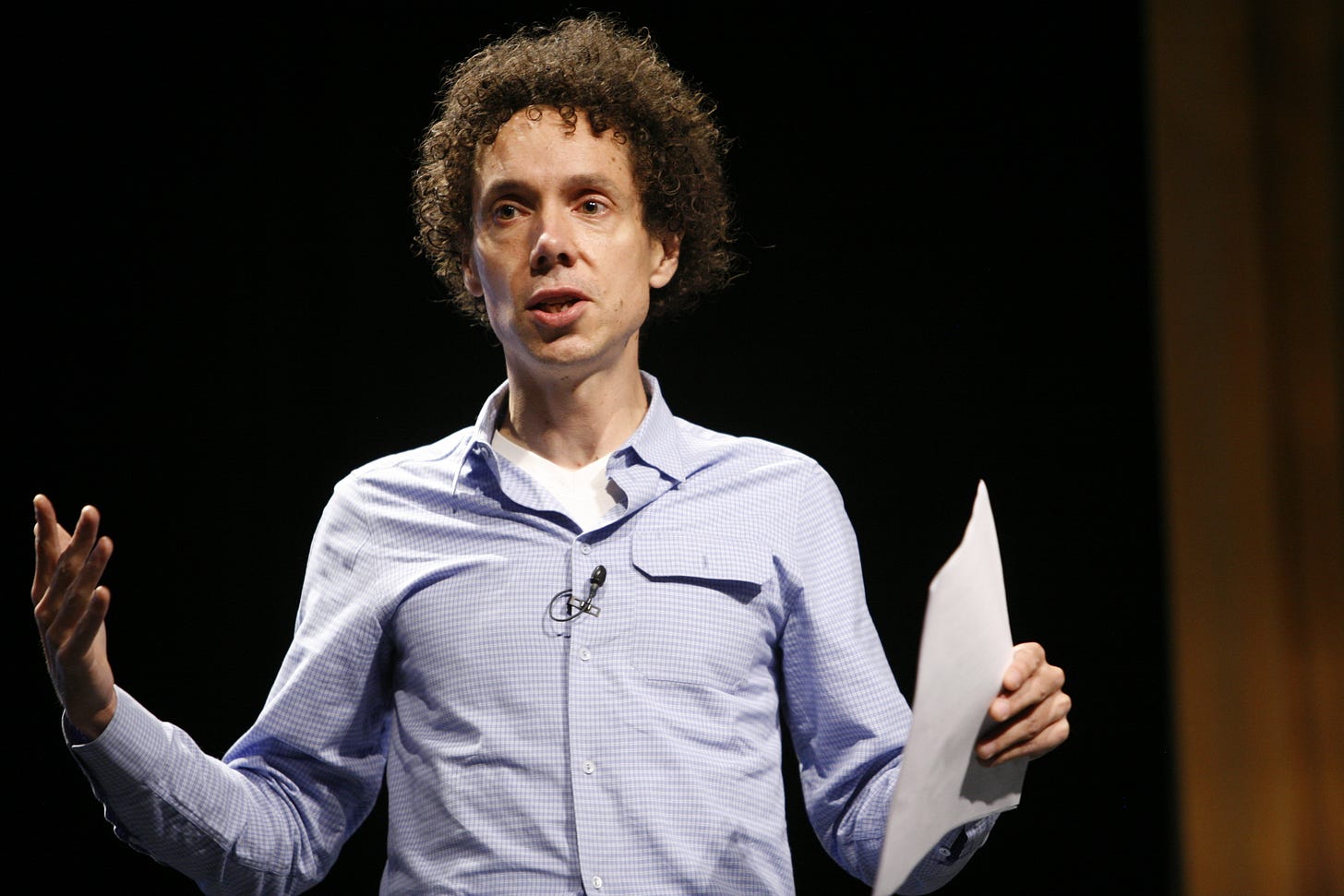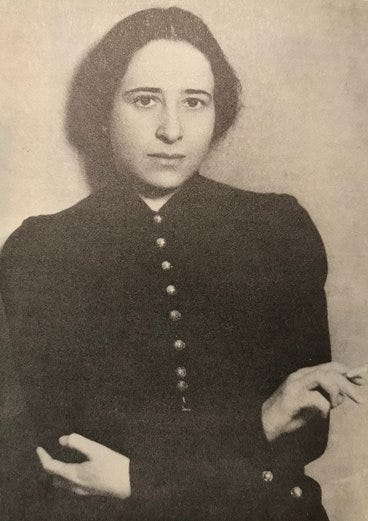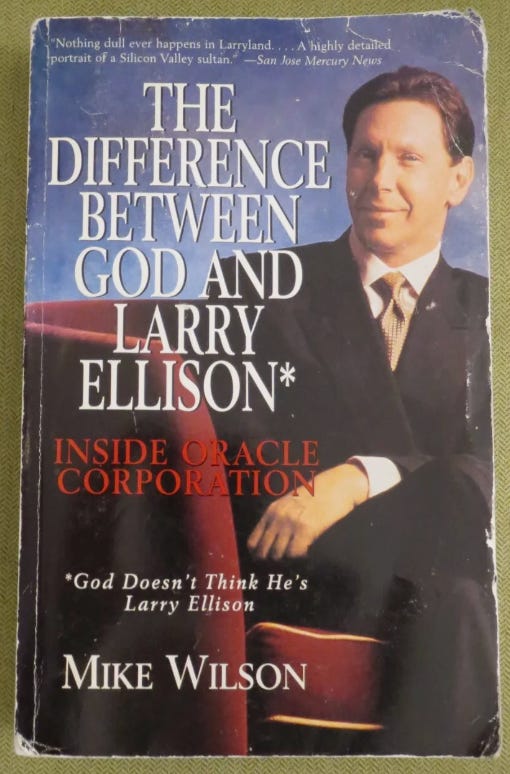Hello,
In a previous post I explored the reasons why Atomic Habits by James Clear has been such a hit.
Now I turn to Malcolm Gladwell’s Outliers: The Story of Success (2008), which will be 16 years old next month.
(This post is longer than normal, so if you are reading it via email, make sure you open it out to see the full version. Or click here to read it in full on Substack).
Outliers is a genuine attempt at a theory of success. It popularized the “10,000 hours or 10 years” rule (the minimum time to get proficient in something), which many people have found valuable.
Gladwell’s literary powers are so great that you are swept along by the narrative. Yet the book rests on a set of assumptions that I want to question.
The 10,000 hours/10 years idea is only one aspect of the book. The larger theme is the relationship between environment and success.
Gladwell is suspicious of the notion of the “self-made” person, and sets about providing evidence for an alternative view - that a successful person is the tip of an iceberg of genes, family, culture, nation, and era.
He writes:
“Their success was not just of their own making. It was a product of the world in which they grew up.”
For Gladwell, there is no mystery to success, even when it comes to super-achievers, or “outliers”. They simply seized the opportunities before them - opportunities that others did not get.
Outliers is about “winning the lottery of life”, or being born in the right place at the right time, with factors such as encouraging parents and helpful genes playing a big role.
Humans as results
It is fashionable to believe that luck and randomness rule, but if you look closely at the achievements of very successful people, you find that their “good fortune” was the result of self-developed habits:
1) Thinking far into the future when no-one else is bothered;
2) Making connections others have not made; and
3) Wishing to transcend circumstances and even personality to do or be something remarkable.
Peter Thiel pointed out in Zero To One (2014) that Gladwell’s philosophy makes us too easily dismiss what may be unusual about successful people - such as the serial entrepreneur who, in the first place, finds value where others didn’t look. Thiel quotes Emerson: “Shallow men believe in luck, believe in circumstances. Strong men believe in cause and effect.”
It took me a while to put my finger on what I found uncomfortable about Outliers. This line crystallized it:
“Successful people don’t do it alone. Where they come from matters. They’re products of particular places and environments.”
Yes, Gladwell actually says “product”.
Now consider an alternative view from philosopher Hannah Arendt. Her concept of “natality” (The Human Condition, 1958) is that each human life carries massive potential which may be entirely unexpected given the milieu into which they were born:
“It is in the nature of beginning that something new is started which cannot be expected from whatever may have happened before...The new always happens against the overwhelming odds of statistical laws and their probability… the new therefore always appears in the guise of a miracle. The fact that man is capable of action means that the unexpected can be expected from him, that he is able to perform what is infinitely improbable. And this again is possible only because each man is unique, so that with each birth something uniquely new comes into the world.”
The idea of unexpectedness being the very essence of humanity goes against the “smart” view promulgated by Gladwell and thinkers ranging from Karl Marx to Pierre Bourdieu to B.F. Skinner, that people are the result of the time and space in which they exist. By this view, there are no great people, only lucky circumstances.
A counter-example: Larry Ellison
In Outliers, Gladwell includes a chapter looking at the relationship between luck and success that focuses on the stars of computing.
He includes a list of the richest people of all time, including Bill Gates and other American software billionaires, to point out a link between certain birth years and the creation of fantastic fortunes.
The phenomenal success of figures such as Gates and Steve Jobs was not due to any inherent greatness, creativity, or originality, but the result of being born at the right time. Jobs, Gates, and his partner Paul Allen, were all were born in 1955, as was Eric Schmidt, the former CEO of Google. Bill Joy, a founder of Sun Microsystems, was born in 1954, and the other founders of Sun were born in 1954 or 1955.
Gladwell does not say that you had to be born in these years to be successful in computing. However, coming into the world in the mid-1950s made you the perfect age to take advantage of any opportunities at the time that involved programming. Born any earlier, and as a talented programmer you probably would have been snapped up by IBM to work on its mainframe computers (and stayed there as an executive with all the comfy perks, not wanting to leave). Born a few years later, and you would have missed being part of the software and personal computer revolution altogether.
Gladwell’s list includes Larry Ellison, co-founder of Oracle and currently the world’s fifth richest person. However, Gladwell chooses not to discuss him, and it seems obvious why: Ellison does not fit the thesis, being born “too early” - in 1944.
Not only does Ellison not fit the “lucky year” thesis, his upbringing and early adulthood provide no indication as to what would come.
Like Steve Jobs, he was given up for adoption by his mother, and was raised by his aunt and uncle in Chicago. But the uncle was not as supportive as Job’s adoptive father. He repeatedly told his nephew that he would “never amount to much”.
Ellison enrolled at the University of Illinois, but his aunt died of cancer during his sophomore year. Heartbroken, he missed the exams and dropped out. Starting again at the University of Chicago, he took physics and mathematics classes. This time, he dropped out after a semester, but did learn one valuable skill: computer programming.
Ellison moved to California and begun working as a journeyman technician and programmer, choosing San Francisco because it was where he thought “all the interesting people were”. Yet through his twenties he moved from one company to another without making any real impact. At an age when Steve Jobs, Bill Gates, and the Google guys Sergey Brin and Larry Page had long since graced the cover of Time magazine as star founders, Ellison was a middle-ranking employee doing data backup work on weekend and night shifts.
Larry got married to Adda, and liked to talk big to her about becoming a millionaire. In fact, he had yet to start a company, and was always spending more than he earned. The year Larry turned 30, Adda divorced him, fed up with his debts and lack of focus. Trying to persuade her to stay, he agreed to see a psychologist. Apparently, he came out of the experience a changed man.
Ellison was at this time working as a programmer for a company called Ampex, helping to create a database for the CIA with the codename “Oracle”. He got interested in the more advanced “relational” databases being talked of at the time, which promised to make real, practical use of reams of complex data.
One day, Ellison was leafing through an IBM journal and saw that the company had announced a release date for its first relational database. Yet IBM was worried the new software would cannibalize existing database revenue, and the project was given the go-slow.
Ellison acted. With his supervisor at Ampex, Bob Miner, and co-worker Ed Oates, the trio raced to get a product out to market before IBM brought out their own. Ellison was 33, Miner 36, and Oates 31.
The first version of the Oracle database was famously unreliable, but was still the best of its kind, providing what everyone wanted: intelligent answers in a split second.
The rest is history. Ellison became a billionaire through his shares in Oracle, shocking his ex-wife.
Miner and Oates, though talented programmers, had not showed any particular streak of ambition. Yet when Oracle went public in 1986, Miner netted at least $300 million. His role in creating one of the great modern companies is worth mentioning because, along with Ellison’s, his story goes against the conventional wisdom that you have to be 22 to do something great.
Entering their 30s, Ellison, Miner and Oates might have started to believe the world had passed them by. But do “the times” really shape human action to that extent? The trio may have missed the personal computer revolution, but their timing was just right for another one: databases.
Michael Dell is worth mentioning in this respect. Because he was born in 1965, Dell was indeed “too late” according to Gladwell’s thesis to be an important player in the emerging personal computer and software revolution. But it didn’t matter, because another huge opportunity came along: selling computers for less through mail order.
Ascribing your fortune to some lucky year of birth can blind you to what’s happening now. Ellison might have grumbled about not having his worth recognized, but he did not panic or conclude he had “missed a boat”.
Ellison’s biographer Mike Wilson (The Difference Between God and Larry Ellison, 1997) notes that many people thought Ellison had simply been in the right place at the right time, that all he had done was find (or copy) a good idea and implement it. Yet there were lots of people who knew about the work that IBM was doing on relational databases. Only Ellison fully grasped the urgency of the situation in terms of bringing a product to market. (The same sense of urgency possessed Gates and Allen to write software for the first personal computer, the Altair 8800, and Ray Kroc to cut a deal with the original McDonald brothers to franchise their restaurant model).
Instead of complaining about their jobs in middle management, Ellison, Miner, and Oates chose to believe that their careers to date had just been a preparation. As Ellison told Wilson:
‘I don’t know of any place or time where there aren’t great possibilities’.
Exactly. You miss one revolution, another one happens. Too late for desktop software? Databases. Too late for databases? Mail order computers. Too late for that? The Internet. Jeff Bezos missed the software and database boats (he was working on Wall Street), but could see plenty of opportunities in online retail. Thousands of people right now are despondent that they won’t ever make a fortune in online retail. So what? AI, crypto, and other waves are building speed as we speak.
Myths of luck and inevitability
Having told us at length that we are essentially products of our environments, deep in Outliers Gladwell comes to a surprising conclusion. He gives the example of Jewish law graduates in the New York of the 1950s who, because they were turned away from the Establishment law firms, had to start their own.
To survive, these lawyers had to take on any work that the traditional “white shoe” firms found distasteful, like corporate takeovers and divorce. But in time this setback would prove to be a great opportunity, when the massive growth in these areas made the non-WASP lawyers well-placed to take advantage and prosper.
Gladwell’s key example is Joseph Flom, who helped build the famous Skadden, Arps, Slate, Meagher & Flom firm. According to Gladwell, Flom “didn’t triumph over adversity. Instead, what started out as adversity ended up being an opportunity”. It was simply that the skills and knowledge that lawyers like him had built up over decades suddenly became more valuable. Flom was essentially a product of lucky time, lucky place.
Then Gladwell makes a telling admission:
“They learned [that] if you work hard enough and assert yourself, and use your mind and imagination, you can shape the world to your desires.”
Belatedly, and contradicting the main thesis of Outliers, Gladwell arrives at the truth of success: that background and circumstances matter a lot, and yet determine nothing. It is easy to pick out a few examples of success and weave a story around them as being somehow representative, but let’s be aware of the counterfactual: there were plenty of men of Flom’s ethnicity, generation, and circumstances who amounted to little.
You may have heard about Harvard University’s famous longitudinal study of a group of its own students, the class of 1940. In the decades after graduation, most members of the class suffered various setbacks, as you would expect. Yet George Vaillant, a key interpreter of the data and author of Aging Well: Surprising Guideposts to a Happier Life From the Landmark Harvard Study of Adult Development (2003), noted that it was not the obstacles themselves that ultimately determined success or failure, but rather the quality of the individual subjects’ response to them, or what he calls “adaptation to life”. The key thing about these responses is that they could not be predicted.
The longer the life, the less justified anyone is in saying that a particular event or circumstance “caused” their success or failure. We are not simply Pavlovian dogs that respond to stimuli. The Gladwellian environment-causation view may go some way to explaining achievement, but it can never fully explain it. It leaves out of the equation that most human thing: the ability to surprise.
Another brief example: Coco Chanel was born illegitimate in the isolated Auvergne region of France in 1883. Her father was largely absent and her mother died when she was only 11. She was eventually taken in to an orphanage run by nuns, who gave her the one skill she needed for her future: sewing. By her mid-twenties, thanks to investments from wealthy lovers, she had opened successful womenswear stores.

Nothing in her rise could have been predicted. You could argue that she was the “right person for the time” in that ready-to-wear women’s clothes were becoming more popular. True, but at the time you could have pointed to hundreds of people who seemed more likely to take advantage of that change and become successful.
Just as lack or poverty is no predictor of outcome, neither are significant advantages at the start of life a promise of anything. Gladwell’s Exhibit A of “fortunate birth” is Bill Gates. Gladwell makes much of Gates having had access, as a schoolboy, to a Teletype terminal - an early computer, when computers only existed in large companies and institutions. This was indeed fortunate, but it undersells what was different or unusual about Gates:
1) He was so confident in his abilities that he dropped out of Harvard (against his parents’ wishes) to start a company (Microsoft);
2) In a time when software had low value and the hardware companies like IBM were making all the money, he and co-founder Bill Allen had the insight that software would be king; and
3) Gates had the unusual vision for a 19-year-old that everyone would eventually have a home computer that “even my mother could use”.

Where did this confidence, insight, and vision come from?
Even Gates’ parents didn’t know.
Conclusion
Outliers is an important book within the philosophy of success. But we should be clear about what it is: a modern expression of an older political tradition encompassing:
1) A Marxist understanding of political economy in which the role of the entrepreneur is downplayed (or as President Obama put it, “You didn’t build that” - meaning state and society are more important).
2) A Skinnerian view of human psychology and agency i.e. we are mere products of environment.
3) A sociology of place, time, and institutions, as propounded by French philosophers such as Bourdieu and Foucault, in which habitus or milieu is more important than will.
Gladwell may not have explicitly studied these thinkers (his BA major was History), but their ideas form the undercurrent of Outliers. If I can sum up this worldview in a few words, it is:
Humans can and must be reduced to explainable units. We are products of our communities, and no-one is better than anyone else.
The alternative view?
Every birth represents a new beginning.
Human beings are questers for the impossible, driven by unexplained desires. It’s perfectly legitimate to want to transcend our background, even our times, to be “great” in some way.
Demographic data will never explain why some people are driven to build things of great utility, quality, or beauty, even when recognition of their efforts is uncertain, when family or community are against them, or when their efforts involve sacrifice of status or income.
Success is always something of a mystery, because it occurs through an individual mind. Our path to success may indeed involve a reaction against our poor/wealthy/suburban/rural/white/black background, but it is still our reaction.
On p. 175 of Outliers Gladwell says:
“success arises from a steady accumulation of advantages: when and where you were born, what your parents did for a living, [and] the circumstances of your upbringing…”
The problem with saying that we are the “product” or “result” of our habitus or milieu is that it engenders a culture of identity politics and victimhood in which every kind of failure is excused. It takes courage and insight to divine trends, see patterns, imagine and build something that no-one knew they needed. Unusual people shape their times and their place.
Peter Thiel made the point that you can’t understand Gladwell without knowing that he is a Baby Boomer, born in 1963. Most of his generation saw yearly improvements in living standards, and assumed they would be richer than their parents. Today’s generations, in contrast, can’t just rely on going to college to get ahead, or enjoy a natural progression of good jobs. They have to become great at one thing, and stay ahead of changes in the economy or society. This requires deep thought, ingenuity, and creativity.
The Gladwell view is that “remarkable people are given remarkable opportunities”, but it makes more sense to say that people make themselves remarkable by refining themselves to the point that they see opportunities others do not. Via personal development, whether secular or religious, they cut away illusions to see reality clearly and understand what their fellow humans need or want. Or, they take a fully egoic path which involves having or cultivating a “sense of destiny” i.e. maximizing the self. In both cases, the wise person refuses to be a product of their environment, good or bad; they wish to transcend it.
If successful people are “products” of anything, it is of the work they have done on themselves over a long period of time to become the best vehicle for what they want to achieve. Some people are self-made.
Kind regards,
Tom
Have you read Outliers? I’d be fascinated to hear your thoughts on it in the Comments section below.
If you’re reading this via email, click into the post on my Substack page to Comment.
Do Like and Share this if you found it interesting.
Tom Butler-Bowdon
Author of the 50 Classics series (click to find out more)
Editor of the Capstone Classics (click on image for more info)
Find me:
Explore my website Butler-Bowdon.com with free book commentaries and interviews
Connect & follow:
Twitter/X - follow
LinkedIn - connect












Whenever you read anything citing a few examples of outlying success, such as Jobs, think of Nassim Taleb and his observation that there will always exist exceptionally successful fund managers, you just don't hear about the other 99%. Regarding Gladwell, if you read carefully there's always an catch in his articles and books, something even as short as a sentence or two that is illogical and refutes his entire argument. For example, he argued the installation of the suicide barrier on the Golden Gate bridge, because suicide is an impulsive act and a barrier would stop people from jumping. The cost of this barrier was $220 million dollars. Are nearly a year in bridge tolls... Not once does he mention that suicide rates in the US have been going up year after year, a barrier, and one of this incredible cost, is not going to make a difference to that reality.
It's a balance, I think, and Gladwell is a positive force in furthering and underrepresented side.
https://ancientwisdommodernlives.com/p/success-control-luck-self-help-books